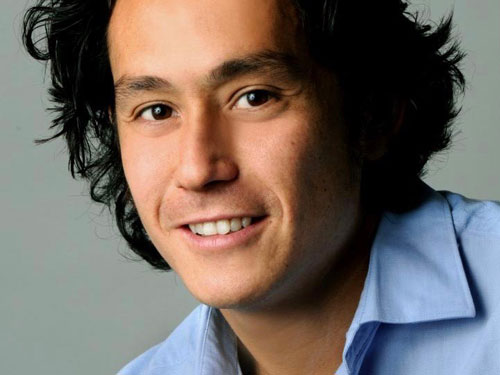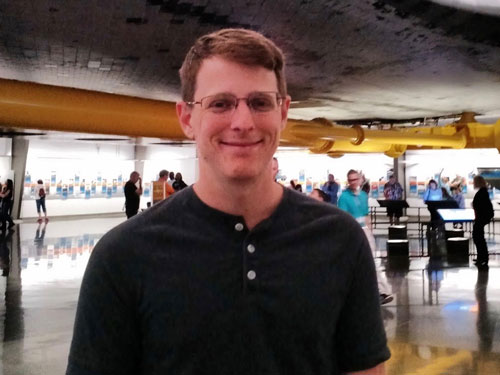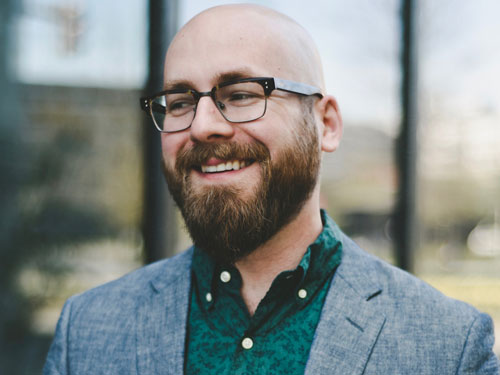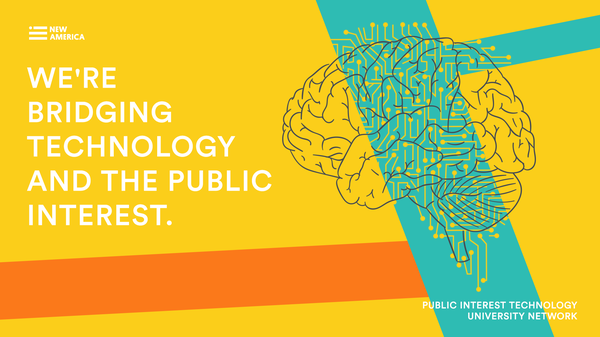Public Interest Technology at UC Berkeley
The page for Public Interest Technology at UC Berkeley has moved! Find the latest news about PIT at UC Berkeley.
On March 11, 2019, the Public Interest Technology University Network — at the time, a partnership of 21 colleges and universities dedicated to building the nascent field of public interest technology and growing a new generation of civic-minded technologists — was announced. UC Berkeley is a charter member, indicating its commitment to educating the next generation of students to more effectively design, build, influence, and govern new technologies in ways that advance the public interest. Professor Deirdre Mulligan was the original UC Berkeley representative to the network.
The idea of conceptualizing public interest technology as a field draws on the history of public interest law which emerged in the 1980s, transformed legal education — fostering the development of legal clinics serving the poor and vulnerable and advocating on behalf of the public — and opened up new career pathways for law school graduates.
In joining the network UC Berkeley played a leadership role in establishing and defining the field of public interest technology within academia and spurring the development of a robust pipeline of students seeking to pursue careers in public interest technology.
Berkeley’s Role in Public Interest Technology
Berkeley has been building the field of public interest technology from the bottom up for nearly two decades. A host of research centers, working groups, experiential learning opportunities, and curriculum have made UCB fertile ground for faculty and students in the field of public interest technology. Faculty and students find support for public interest-oriented research in centers such as the Algorithmic Fairness & Opacity Working Group (AFOG) — an interdisciplinary group of UC Berkeley faculty, postdocs, and graduate students developing new ideas, research directions, and policy recommendations around issues of fairness, transparency, interpretability, and accountability in algorithms and algorithm-based systems, the Berkeley Center for Law & Technology (BCLT) — a multidisciplinary research center exploring the most pressing technology law and policy issues, the Center for Effective Global Action (CEGA) — a West Coast hub for global development research identifying and testing innovations designed to reduce poverty and promote development, the Center for Human Compatible AI (CHAI) — a multi-institution research group aimed at developing the conceptual and technical wherewithal to reorient the general thrust of AI research towards provably beneficial systems, and CITRIS and the Banatao Institute — a center that leverages the research strengths of University of California campuses at Berkeley, Davis, Merced and Santa Cruz to facilitate interdisciplinary work among hundreds of faculty members, students, corporate partners, and international institutions to address critical challenges such as designing sustainable energy, water and transportation systems; improving the human experience with robotics and inclusive intelligence; modernizing health care delivery; promoting diversity in the tech sector; examining the future of work and the global economy in the age of automation; and fostering responsible tech policy through the CITRIS Policy Lab. The CITRIS Policy Lab supports interdisciplinary technology policy research and engagement to support public- and private-sector technology and policy strategies in such areas as inclusive artificial intelligence, personal data privacy, digital access equity, and the influence of social media on democracy. The CITRIS Seed Funding Program provides early-stage funding to collaborative projects involving technology in the public interest aligned with the research areas above.
Public interest oriented students find additional support at student-led centers and initiatives including the Center for Technology, Society & Policy (CTSP) — a multidisciplinary research & design/build center focusing on the emergent social and policy issues arising from the development and adoption of technology, and the Graduates for Engaged and Extended Scholarship in Computing and Engineering (GEESE) which supports a community of graduate students and postdocs interested in working at the intersection between engineering and the social sciences and humanities to prepare themselves to tackle the emerging ethical dilemmas and opportunities for social change presented by new forms of technological disruption.
Students gain hands-on training on public interest issues at the Samuelson Law, Technology & Public Policy Clinic — the leading clinical program in technology law and the public interest, the Human Rights Investigations Lab — the first university-based initiative of its kind in the world engaging students from multiple disciplines in real-world open source investigations of human rights abuses and potential war crimes, the Citizen Clinic — the world's first public-interest cybersecurity clinic supporting the capacity of politically-vulnerable organizations and communities — including media outlets, human rights groups, and non-government organizations — that are at risk of cyberattack, the CITRIS Tech for Social Good Program, which provides funding support to undergraduate, graduate, and postdoctoral students in interdisciplinary research teams to develop hardware, software, events or programs that support healthy, sustainable, connected, and equitable livelihoods in the United States and abroad, and the CITRIS Invention Lab, which provides expertise, community knowledge, tools, and materials to support students, faculty, staff, and individual researchers in moving their public interest technology from idea to prototype.
These programs are helping to build the public interest pipeline.
Berkeley Alumni in the Field
Meet some of our alumni to see the positive change they make in the world.
|
Alessandro Acquisti, (Berkeley School of Information Ph.D. 2003), Professor of Information Technology and Public Policy at the Heinz College at Carnegie Mellon University “Put simply: I would not be where I am now without Berkeley. My Ph.D. at the I School, and the interactions with so many great scholars (and fellow students) opened my horizons and gave me the opportunity to do, today, the research I love.” |
|
|
Joshua Blumenstock, (Berkeley School of Information Ph.D. 2012), Professor at Berkeley School of Information “Berkeley in general — and the School of Information in particular — provided a unique environment that allowed me to explore different disciplinary and methodological approaches to tackling social problems. I felt privileged to have close advisors from several different departments, who each took me on as one of ‘their own,’ though they had no formal obligation to do so.” |
|
|
danah boyd, (Berkeley School of Information Ph.D. 2008), Founder of Data & Society Research Institute and Researcher at Microsoft “I came to Berkeley because of Peter Lyman, who was my advisor, mentor, and advocate…He helped me channel my energy towards viable systemic change. He helped me understand that the fight was long-term and that I needed skills, networks, and knowledge to make change.” |
|
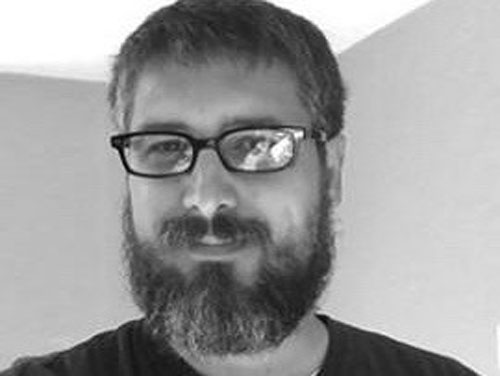 |
Brian Carver, (Berkeley Law J.D. 2006, Berkeley I School Faculty 2008-2015), Copyright Counsel at Google “The opportunities that Berkeley Law provided to work with faculty such as Pam Samuelson and to participate in the Samuelson Law, Technology & Public Policy Clinic were exactly what I was looking for in terms of technology law projects that really understood the importance of the public interest in technology policy.” |
|
Will DeVries, (Berkeley Law J.D., 2004), Senior Privacy Counsel at Google “It is safe to say my choice to go to Berkeley set my professional path. The most interesting thing happening in law and policy was technology, and Berkeley was the place where it was happening. More than just ‘how to be a technology lawyer,’ Berkeley offered ‘how technology will change society and how to be a professional that shapes those changes.’” |
|
 |
Dipayan Ghosh, (UC Berkeley Postdoctoral Researcher), Pozen Fellow at the Shorenstein Center on Media, Politics and Public Policy at the Harvard Kennedy School “Having the chance to work with professors like Deirdre Mulligan and Shankar Sastry was a dream come true. Here were two people at the top of the field and who personally encouraged and supported my interest in public policy and government.” |
 |
Jess Hemerly (Berkeley School of Information MIMS 2011), Manager, Government Affairs & Public Policy at Google “I would not have entered the technology public policy field if it wasn’t for the guidance and mentorship of Deirdre at the I School. What’s more, the range of practical experience I gained at the I School—from Python to quantitative research methodologies—put me in a position to work really well cross-functionally in my current role.” |
 |
Jennifer King, (Berkeley School of Information Ph.D. 2018, MIMS 2006), Director of Consumer Privacy at the Center for Internet and Society at Stanford Law School “Attending Berkeley was a game-changer for me. I found a community that understood that building and studying technology included more than chasing the latest start-up trend or only focusing on the engineering aspects — I found people who also cared about how technology shapes society, and the need to build systems that respect human values.” |
|
Alex Kozak, (UC Berkeley B.A. Philosophy, 2009), Public Policy Manager at X, the moonshot factory “My experience at Berkeley was foundational for my career in public policy. The Philosophy department was great training for tackling deep questions and debates with intellectual rigor and honesty. The I School gave me tools to think about how technology design, law, and the public interest intersect.”
|
|
|
Michael Lissner, (Berkeley School of Information MIMS, 2010), Executive Director at Free Law Project “The final project I completed in 2010 while a student at Berkeley was CourtListener.com. At the time it was a simple project to keep track of new court filings, but since then I worked with my advisor from Cal to form a non-profit to support the effort, and now, nearly a decade later, we work hard to make a more competitive, just, and fair legal system in America.” |
|
|
Andrew McDiarmid, (Berkeley School of Information MIMS 2008), Sr. Project Manager for Product Trust at Twitter “Pam Samuelson, Deirdre Mulligan, and their colleagues working in law & technology turned me on to technology's role in the exercise of rights and the need for democratic norms & values to inform technology's development.” |
|
 |
Nicole Ozer, (Berkeley Law J.D. 2003), Technology and Civil Liberties Director for the ACLU of California “I came to Berkeley because I read that it was about to open the Samuelson Clinic — the first public interest technology law school clinic in the country. The Clinic and the broader Berkeley academic community is directly responsible for the course of my legal career and my 15 years building and leading the Technology and Civil Liberties Project of the ACLU of California.” |
 |
Heather Patterson, (Berkeley Law J.D. 2012), Senior Research Scientist at Intel “The Samuelson Law, Technology & Public Policy Clinic provided me with a social justice community and a roadmap for pursuing public interest work. It also provided me with some particular areas of interest. I often think that my first Clinic project really set the stage for my life's passion.” |
|
Emily Paul, (Berkeley School of Information MIMS 2016), TechCongress Fellow “During my time at the I School I was able to study the theory behind the different disciplines involved in creating technology and understanding its implications and to put those different disciplines into practice. That experience helped me see the importance of all the decisions that go into determining how and in what contexts [technology] is implemented and how it is used on a daily basis.” |
|
|
Aaron Perzanowski, (Berkeley Law J.D. 2006; Microsoft Fellow 2008-09), Professor of Law at Case Western Reserve University Law School “My time at Berkeley Law, and in particular my experience in the Samuelson Law, Technology & Public Policy Clinic, profoundly shaped my career. In many ways, my research agenda continues to explore issues I first encountered fifteen years ago as a clinic student. More fundamentally, I attribute my understanding of the ways in which law and technology implicate the interests of consumers and the public broadly to my experiences at Berkeley.” |
|
 |
Aaron Rieke, (Berkeley Law J.D., Certificate of Law and Technology, 2010), Managing Director at Upturn “At Berkeley, I didn't just learn about law or technology. I learned about both in an interdisciplinary, service-oriented setting that set the tone for my entire career. Almost a decade later, my Berkeley professors and classmates are important professional colleagues.” |
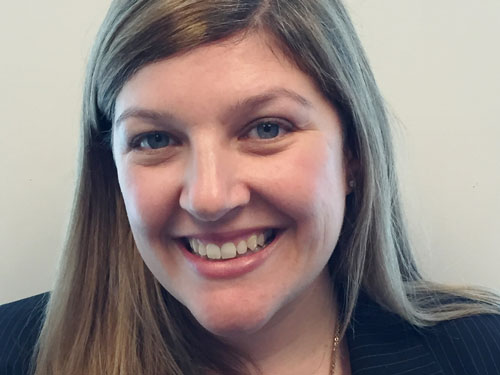
|
Stacey Schesser, (Berkeley Law J.D., 2006), Supervising Deputy Attorney General at California Department of Justice “Berkeley gave me an incredible foundation for my career. As a member of the Samuelson Clinic, I solidified my interest in public interest technology legal practice. I also felt empowered and inspired seeing women in technology law, and confident that I could enter this area of the law. I am deeply grateful for my time at Berkeley.” |
|
Sherwin Siym, (Berkeley Law J.D. 2005), Professorial Lecturer in Law at George Washington University “The Samuelson Clinic was my first real exposure to the breadth of work that goes into public interest technology law — not only the doctrinal matters at issue, but also how new issues get framed in the press, what a press release looks like, how the law is formed, and more.” |
|
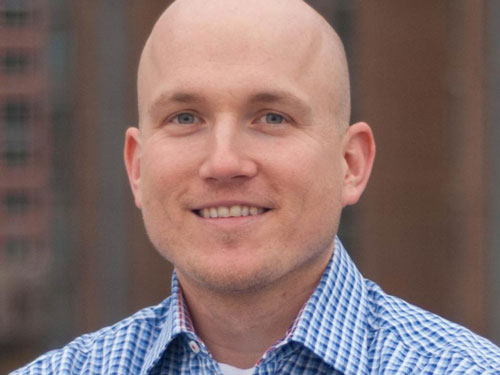 |
Steve Trush, (Berkeley School of Information MIMS 2018, Graduate Certificate in ICTD), Deputy Director of Citizen Clinic at Center for Long-Term Cybersecurity “I came to UC Berkeley to learn how to create technology for positive social impact. From the support of the Center for Technology, Society, and Policy, the Center for Long-Term Cybersecurity, and the School of Development Practice, UC Berkeley set me on a path towards a career focused on protecting marginalized communities and at-risk populations from emerging sociotechnical threats.” |
|
|
Jennifer Urban, (Berkeley Law J.D. 2000, Samuelson Law, Technology & Public Policy Clinic Fellow), Clinical Professor of Law at UC Berkeley School of Law, co-director Berkeley Center for Law and Technology “Berkeley is the very heart of my career! At the time I came to Berkeley for law school, it was rare to see tech issues like IP and innovation policy connected to public interest issues, but Berkeley was way ahead of the pack. I benefited enormously from Berkeley's innovative and rich program. Today, I get to collaborate with the fabulous faculty, staff, and students at Berkeley Law, the Information School, and other programs on campus.” |
 |
Emily Witt, (Berkeley School of Information MIMS 2017), User Researcher at Salesforce “It was not only the professors and curriculum, but also through ongoing conversation with classmates that helped me build the habit of critically examining proposed technology solutions to complex social problems while maintaining an energetic optimistic pragmatism towards thoughtfully using tech to support human efforts to work towards justice and equity in our communities.” |











